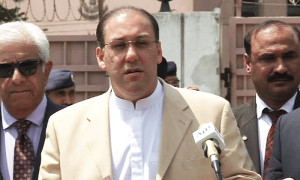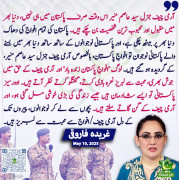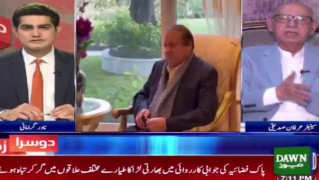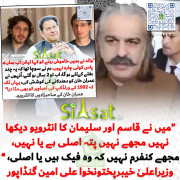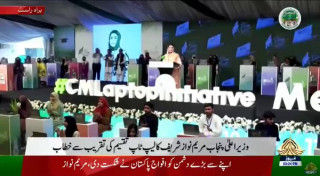Re: Recitation of Qu'raan for the deceased ones
I read your reply and am sorry to say that you follow a strange version of Islam which the world never heard of in the first three centuries or so. You r refuting the Hadees because of your love for that particular group.
Recitation of Qur'aan for the deceased ones:
The permissibility of this act is a matter of dispute amongst scholars. However, all scholars agree that this act was never practiced by Allah's Messenger (صلى الله عليه و سلم) and his companions.
Shiakh Al-Islam, Ibn Taymiyyah, said in his majmo' Al-Fatawa:
" In regards reciting Quran so the reward be going to the deceased; some scholars said: the decased will benefit from such recitation and this is the Madhab of Ahmad, Abu hanifah and some of the Shafi'e scholars. while others said the deceased do not benefit from Quran Reciattion that were recited by others and this is the famous opinion in the Maliki and Shafi'e Madhabs."
What should we do in this case?
It is better to refrain from doing with the intention to follow the exact steps of the Prophet (صلى الله عليه و سلم) and seek another authentic means to give via its reward to the deceased i.e. Charity, Hajj and etc.
If you find people doing so then do not be upset and if you wish to advise them then advise them although it might be allowed but it is better to do what Allah's Messenger (صلى الله عليه و سلم) did. Read more...
Another article for reading...
I read your reply and am sorry to say that you follow a strange version of Islam which the world never heard of in the first three centuries or so. You r refuting the Hadees because of your love for that particular group.
Some authentic Hadees
1]
Imam al-Bukhari writes:
"Prophet Muhammad (may Allah bless him and grant him peace) has said, 'The status of the deceased is raised [during their time in the grave], and the deceased ask Allah why this has happened. Allah replies, 'Your son has prayed for your forgiveness'"
►[al-Bukhari, Al-Adab Al-Mufid, chapter on 'Excellency of Parents']
2]
The Prophet of Allah Said: Recite It (Iqarahu) on ('Inda) the deceased/dying that means Surah Yaseen.
(Sunan Ibn Majah, Kitab Al Janaiz #1438)
The commentator of Sunan Ibn Majah further states:
قوله ( عند موتاكم )
His saying : On the deceased/dying -- That is to say on the dying or (Aw) after (Ba'ad) death Also.
(Sharh Sunan Ibn Majah Al Sanadi , Ibid)
[FONT=verdana,geneva]In the commentary of Sunan Abu Dawud, entitled Awn Al Ma'bud Sharh Sunan Abi Dawud it states:
[/FONT]
[FONT=verdana,geneva]وعند النسائي من حديث ابن عباس " أنه صلى على جنازة فقرأ بفاتحة الكتاب وسورة وجهر فلما فرغ قال سنة وحق
And in NAsai the hadith from Ibn Abbas: He prayed the funeral prayer and read the Fatiha.
[/FONT]
[FONT=verdana,geneva]
[/FONT]
3]
The Prophet said: iqra'u `ala mawtakum ya seen "Read Ya Seen over those of you who are dying/deceased."
References
►Abu Dawud in his Sunan (Jana'iz)
►al-Nasa'i in his Sunan (`Amal al-yawm wal-layla),
►Ibn Majah in his Sunan (Jana'iz),
►Ibn Hibban in his Sahih (Ihsan), and he declared it sound (sahih).
1]
Imam al-Bukhari writes:
"Prophet Muhammad (may Allah bless him and grant him peace) has said, 'The status of the deceased is raised [during their time in the grave], and the deceased ask Allah why this has happened. Allah replies, 'Your son has prayed for your forgiveness'"
►[al-Bukhari, Al-Adab Al-Mufid, chapter on 'Excellency of Parents']
2]
The Prophet of Allah Said: Recite It (Iqarahu) on ('Inda) the deceased/dying that means Surah Yaseen.
(Sunan Ibn Majah, Kitab Al Janaiz #1438)
The commentator of Sunan Ibn Majah further states:
قوله ( عند موتاكم )
His saying : On the deceased/dying -- That is to say on the dying or (Aw) after (Ba'ad) death Also.
(Sharh Sunan Ibn Majah Al Sanadi , Ibid)
[FONT=verdana,geneva]In the commentary of Sunan Abu Dawud, entitled Awn Al Ma'bud Sharh Sunan Abi Dawud it states:
[/FONT]
[FONT=verdana,geneva]وعند النسائي من حديث ابن عباس " أنه صلى على جنازة فقرأ بفاتحة الكتاب وسورة وجهر فلما فرغ قال سنة وحق
And in NAsai the hadith from Ibn Abbas: He prayed the funeral prayer and read the Fatiha.
[/FONT]
[FONT=verdana,geneva]
[/FONT]
3]
The Prophet said: iqra'u `ala mawtakum ya seen "Read Ya Seen over those of you who are dying/deceased."
References
►Abu Dawud in his Sunan (Jana'iz)
►al-Nasa'i in his Sunan (`Amal al-yawm wal-layla),
►Ibn Majah in his Sunan (Jana'iz),
►Ibn Hibban in his Sahih (Ihsan), and he declared it sound (sahih).
Since one of your links say that Imam Nawawi declared a Hadees of Tirmidhi as zaeef it doesnt tells us that what his beliefs were on this particular issue. He only declared one Hadees zaeef but didnt say that the whole process is wrong. For understanding his beliefs on this issue read below.
Imam Nawawi (Rehmatuallah alihe)[FONT=verdana,geneva]
It is narrated in Sahih Muslim from Amr bin al-Aas (RA) that he said: When you have buried me then stand around my grave for a time in which a Camel could be slaughtered and its meat is distributed, so that I may "ENJOY YOUR COMPANY" and ascertain what answer I can give to the messengers (angels) of Allah.
It is narrated in Abu Dawud and Baihaqi with "HASSAN" chain from Uthman (RA) who said: The Prophet (Peace be upon him) after burying the deceased used to stand (on his side) and say: Ask Allah for his forgivenss and that he should stand firm because he is being questioned.
Imam Shafi'i (rah) and his companions said: To recite something from Quran (at the grave) is recommended, If "KHATAM UL QURAN" is done then it is even better.
It is narrated in Sunnan Baihaqi with "HASSAN CHAIN" that Ibn Umar (ra) considered it Mustahab to recite Beginning and ending Ayahs of Surah Baqarah at the grave after burying [Kitab ul Adhkaar, Page No. 278]
Imam Nawawi (Rehmatuallah alihe)
Kitab ul Adhkaar by Imam Nawawi (Rahimuhullah) - Published by Dar ul Manhaaj, Jeddah, Saudi Arabia

[FONT=verdana,geneva]Page No. 278

[/FONT][/FONT]
Imam Nawawi said: "Whoever visits a grave, let him greet its dweller, recite some Qur'an, and make an invocation for the deceased."
►al-Nawawi, Minhaj al-Talibin, end of Kitab al-Jana'iz.
Imam Nawawi (Rehmatuallah alihe)[FONT=verdana,geneva]
It is narrated in Sahih Muslim from Amr bin al-Aas (RA) that he said: When you have buried me then stand around my grave for a time in which a Camel could be slaughtered and its meat is distributed, so that I may "ENJOY YOUR COMPANY" and ascertain what answer I can give to the messengers (angels) of Allah.
It is narrated in Abu Dawud and Baihaqi with "HASSAN" chain from Uthman (RA) who said: The Prophet (Peace be upon him) after burying the deceased used to stand (on his side) and say: Ask Allah for his forgivenss and that he should stand firm because he is being questioned.
Imam Shafi'i (rah) and his companions said: To recite something from Quran (at the grave) is recommended, If "KHATAM UL QURAN" is done then it is even better.
It is narrated in Sunnan Baihaqi with "HASSAN CHAIN" that Ibn Umar (ra) considered it Mustahab to recite Beginning and ending Ayahs of Surah Baqarah at the grave after burying [Kitab ul Adhkaar, Page No. 278]
Imam Nawawi (Rehmatuallah alihe)
Kitab ul Adhkaar by Imam Nawawi (Rahimuhullah) - Published by Dar ul Manhaaj, Jeddah, Saudi Arabia

[FONT=verdana,geneva]Page No. 278

[/FONT][/FONT]
Imam Nawawi said: "Whoever visits a grave, let him greet its dweller, recite some Qur'an, and make an invocation for the deceased."
►al-Nawawi, Minhaj al-Talibin, end of Kitab al-Jana'iz.


